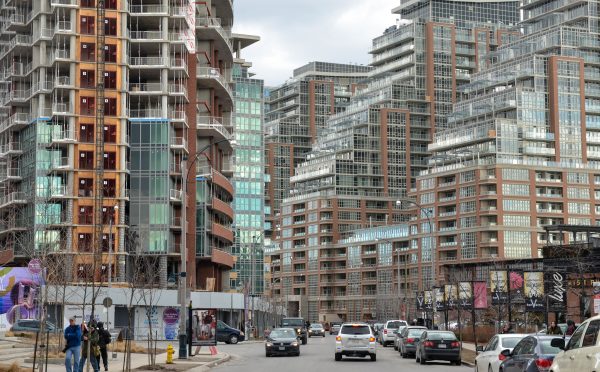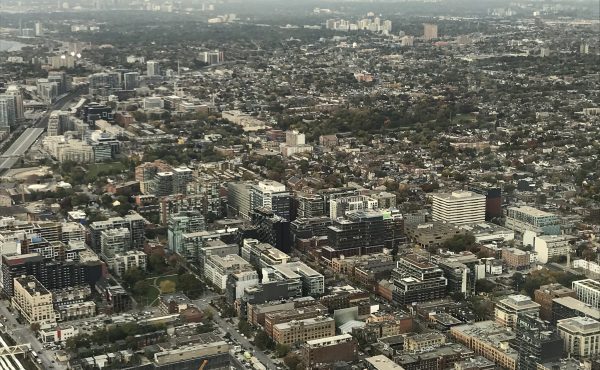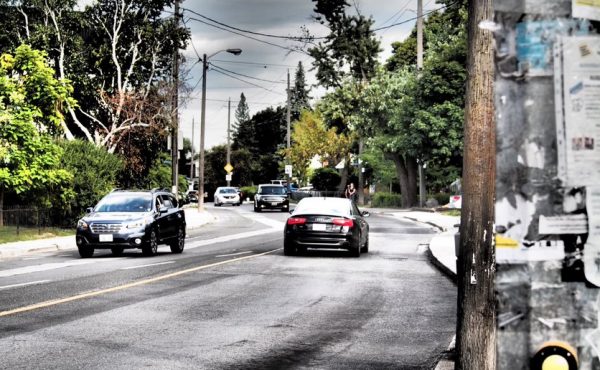A few weeks ago, a story broke about a family of five who relocated to Toronto from Switzerland for a ten-month work assignment. Unable to find housing, they turned to Airbnb to find a home close to public transit, schools, and work. This story sounds like Airbnb promotional material right up until the point where the family received a bogus eviction notice barely six months into their stay and with less than four weeks’ notice. As a result of the eviction attempt, what could have been an Airbnb ad has opened our eyes to a new problem for Toronto tenants — Airbnb’s long-term shadow rental market.
A deep dive into Airbnb data (checkmark “only short-term rentals” to see how few remain on the platform) illustrates the size of the problem. Today, Airbnb offers more than 12,000 long-term listings in Toronto available on a monthly basis (for a minimum of 28 days, or longer). This inventory represents more than 75% of the company’s total inventory in Toronto. Before the City’s short-term rental rules were enacted in January 2021, which are based on a new bylaw that defines short-term rentals as rentals of 28 days or less and restricts the use of housing stock for short-term rentals to a person’s principal residence, long-term rentals of 28 days or more represented only 15% (or less than 2,000 units) of Airbnb’s total offering. How can we explain this shift? Why has a short-term rental platform become a repository for long-term rentals?
The answer to this question differs from what you would expect. While Toronto has always had some executive rentals available to accommodate professionals on work assignments or out-of-town parents booking into a place while their loved ones were being treated at Sick Kids, what we see today differs from a market response to growing demand. Nor has COVID-19 changed our travel behaviour enough to warrant such a shift. Instead, Airbnb’s long-term rental business is the company’s response to the City of Toronto’s short-term rental bylaw.
Comparing pre-regulation with post-regulation Airbnb data clarifies this point. Once the City’s short-term rental bylaw and associated regulatory framework came into effect in January 2021, only properties that were someone’s principal residence were allowed to be rented short-term on platforms like Airbnb. Investment units routinely used by property managers and so-called “super hosts” were no longer permitted under Toronto’s new bylaw, which defines short-term rentals as rentals of 28 days or less. While observers expected Airbnb to cull its ghost hotel inventory, the company didn’t. To get around the City’s rules, Airbnb adjusted the booking terms for its non-compliant inventory to 28 days or more. This move created a large pool of legal long-term rentals on the platform overnight, growing it from less than 2,000 pre-regulation to over 8,000 after the City’s rules were enacted. This inventory has since grown to over 12,000 available long-term rentals today. We can expect this number to grow even further as time progresses.
Why does this matter, you may ask?
Simply, it matters because the company has positioned itself between landlords and tenants and the tenancies are enacted by signing Airbnb’s service agreement, not by signing an Ontario Standard Lease. While platforms like Kijiji or Craigslist have long advertised apartment rentals, they merely put landlords and tenants in touch, followed by signing a formal lease agreement. Airbnb, however, inserted itself into this relationship by handling everything, from the “booking” to the payment, including issuing hefty service fees. This situation may encourage landlords to use Airbnb to avoid their responsibilities under Ontario’s Residential Tenancies Act (RTA). They may feel they can more flexibly dispose of tenants simply by cancelling their “booking.” It is still unclear whether tenants staying in a place booked through Airbnb will be protected under Ontario’s RTA. It may also be the case that many newcomers entering into long-term tenancies via Airbnb do not know their rights as tenants under Ontario law. Moreover, landlords who feel they can make more money during the summer may simply cancel a booking to take on new “guests” at twice the rate. Once cancelled, Airbnb will quickly follow up by sending notes to the tenants reminding them they must leave by a specific date, irrespective of Ontario’s laws, as was the case experienced by the Swiss family mentioned above.
As accessing rental housing becomes increasingly difficult for tenants in Toronto, leaving access to more than 12,000 housing units to a Silicon Valley-based tech company notorious for exploiting regulatory loopholes is a recipe for disaster. At the same time, these 12,000 units present low-hanging fruit in quickly adding already-built inventory to the market for long-term renters.
It is high time for us to examine how to ensure Airbnb acts within provincial laws and municipal regulations, to tweak these if needed, and for any mayoral candidate running in the June election to promise voters that they won’t fall for any of Airbnb’s regulatory tricks.
Thorben Wieditz is an urban geographer who works at the intersection of labour, community and big tech. He is the Executive Director of Fairbnb Canada Network, which helped establish regulatory frameworks for companies like AirBnB in Toronto, Vancouver, Winnipeg and Ottawa. Follow him on Twitter @twieditz.
photo by Mary Crandall





9 comments
It is not the law that the Act always override any agreement ?
You know Airbnb doesn’t own any of those properties, right? They are independently owned and operated by taxpaying citizens of Toronto. The glut of 28+ units available today is a direct response to the City’s regulations from those owners. Airbnb has very little to do with it. The city has made it illegal for people to host guests in their own homes. As a homeowner who has enjoyed hosting guests using the Airbnb platform I am very saddened by what I consider over reach by city officials. This is a democratic country, I should be able to decide who and for how long people stay in my home.
Perhaps if the focus was on fixing the landlord tenant board backlog that currently sits at 7 to 8 months before even having a hearing when someone just decides they aren’t going to pay rent anymore, landlords wouldn’t look at short stay rentals where eviction is “easier.”
If landlords don’t make their mortgage payments the bank can kick them out in 30 days But if it’s a landlord tenant issue it can go on for a year or longer.
Solve that systemic issue and less landlords will go through the hassles of turning over units every 28 days just to avoid being trapped.
Instead of dealing with the the chronic shortage of housing (for purchase or rent), let’s ban AirBNB instead. Problem solved easy answers always provide the best solutions.
@Elaine May: Guests stay for free. If they are paying, they aren’t guests
Elaine,
So long as _YOU_ reside there, you can rent up to three rooms (no duration limit) or your whole dwelling (for no more than a total of six months) for as long or as short as you like. You just need to register with the city.
What you can’t do is rent out non-primary residences for short terms, aka running an AirBnB ghost hotel and pay none of the taxes, nor be inspected, associated with operating a hospitality business.
AirBnB and other long term accommodation brokers must be forced to use the standard lease and inform parties of their rights in the province of Ontario.
Property rights are not absolute.
When the pandemic brought me back to Toronto, a longer term AirBnB rental was my saviour. I needed a place to live while I searched for more permanent housing. The AirBnB rental came furnished, had a great location for getting around town by bike/transit, all utilities were already hooked up (and included in the rental price) and the duration was flexible. I ended up staying at the AirBnB rental for 4 months before I managed to find long term housing and move in. No way could I have afforded 4 months of hotel bills and traditional rental units wanted a minimum 1 year lease plus I would have to hook up all the utilities, furnish it etc etc. While AirBnB has issues, it’s not going anywhere because it does serve a genuine need.
I live in a row house on Toronto’s west side. I Airbnb my basement room all year. It does not have a kitchen and would therefore not be rentable as a separate apartment at any time. If I couldn’t Airbnb it, it would just be a guest room. I comply with all city laws and regulations.
My wife and I travel a lot and we are frequently away for several months at a time. When we are, we often rent our house out on Airbnb and other platforms for longer than 28 days. We could not rent it out to tenants full time, as we would then have nowhere to live.
Thorben Wieditz is so blindly opposed to any kind of short-term rentals, he lumps them all into the same category: arrangements that deprive “real” tenants of housing stock. Well, we are not reducing Toronto’s rental housing stock in anyway. There are many people in situations like us. As usual, the truth is more complex than the political heat that surrounds it.
This is kind of a bogus article. It represents a huge portion of the airbnb market because Toronto’s airbnb by-laws are so strict limiting short term rentals en masse and the only thing that makes airbnb so attractive for people with an extra space is how broken LTB and the RTA really is.